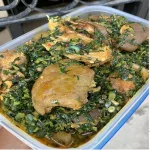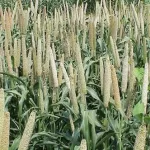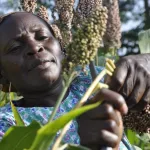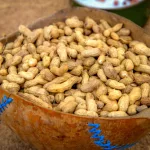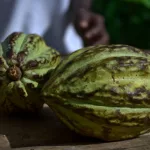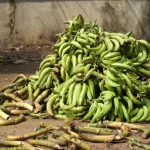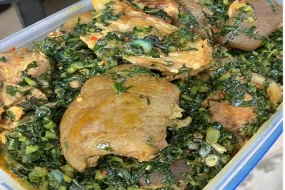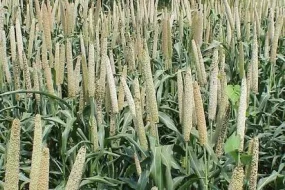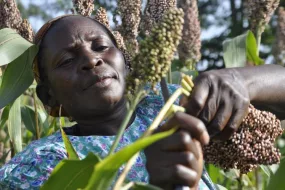Exploring the Vibrant Palette of Nigerian Foodstuff
Nigeria is a West African country with a diverse culture and a rich culinary heritage. It has a plethora of unique and flavorful foodstuffs, from the fertile plains of the south to the arid landscapes of the north. Nigerian cuisine is a tapestry of ingredients that have shaped its vibrant cooking, and its heart lies in the use of indigenous produce, herbs, spices, and traditional cooking techniques that have been passed down through generations. These flavors not only reflect Nigeria’s agricultural abundance but also embody the spirit of communal dining and celebration that is intrinsic to Nigerian culture.
In this journey through Nigerian foodstuff, we’ll explore a palette that ranges from staples like yam and rice to exotic spices like uziza leaves and dawadawa. This will give us a glimpse into the soul of a nation where every meal tells a story. Join us as we embark on a culinary expedition through the bountiful world of Nigerian ingredients, where taste meets tradition in every bite.
A list of popular Nigerian foodstuffs
Rice: A staple in Nigerian cuisine, often served with various stews and sauces.
Yam: A versatile tuber used to make dishes like yam porridge and yam pottage.
Plantains: Fried plantains are a popular side dish or snack.
Cassava: Used in various forms, such as garri (cassava flakes) and fufu.
Palm Oil: An essential cooking ingredient for many Nigerian soups and stews.
Pepper: Various types of hot peppers are used to add spice to dishes.
Onions: A key ingredient in Nigerian cooking, adding flavor to many dishes.
Tomatoes: Often used to make tomato stew or sauce.
Vegetable Oil: Widely used for frying and sautéing.
Groundnut (Peanuts): Used to make groundnut soup and as a snack.
Okra: A green vegetable used in soups like okra soup.
Egusi (Melon Seeds): Ground melon seeds are used in soups and stews.
Stockfish: Dried fish used to flavor soups and stews.
Crayfish: Dried and ground for seasoning.
Periwinkle: A type of shellfish used in various dishes.
Pounded Yam Flour: Used to make pounded yam, a popular Nigerian swallow.
Millet: Used to make a traditional Nigerian drink called “Kunu.”
Sorghum: Used for making various traditional Nigerian dishes.
African Breadfruit: Used in dishes like Ukodo (yam and plantain pepper soup).
Bitter Leaf: Used to prepare the traditional Igbo soup, “ofe onugbu” (bitter leaf soup).
Afang Leaves: Used in the preparation of Afang soup, a delicious Nigerian delicacy.
Ogbono (African Bush Mango Seeds): Ground into a thickening agent for soups.
Bitter Kola: A nut used in traditional ceremonies and sometimes chewed as a snack.
Scent Leaves: Used to flavor soups and stews.
Oha Leaves: Essential in the preparation of Oha soup, a traditional Igbo dish.
Palm Nut: Used to make palm nut soup, a popular Nigerian dish.
Achi: A thickening agent for soups, often used in Igbo cuisine.
Cameroon Pepper: A type of hot pepper used to spice up dishes.
Uziza Leaves: Adds a distinct flavor to Nigerian soups and stews.
Ground Rice: Used to make dishes like rice and groundnut soup.
Cocoyam: Used to make dishes like cocoyam pottage and thickening soups.
Ginger: Adds flavor and aroma to many Nigerian dishes.
Cucumber: Often used in Nigerian salads and garnishes.
Banga Spice: Used in the preparation of banga soup.
Ewedu Leaves: Essential for making ewedu soup.
Suya Spice: A special blend of spices used for making Nigerian suya.
Moi Moi Leaves: Used to wrap and steam the popular Nigerian bean pudding.
Ponmo (Cow Skin): Used in dishes like peppered ponmo.
Kilishi: A Nigerian version of beef jerky, seasoned with spices.
Zobo Leaves: Used to make the refreshing Nigerian hibiscus drink, “zobo.”
Ogiri: A strong-smelling traditional Nigerian condiment.
Cassava Flour (Garri): Used to make eba, a common Nigerian swallow.
Gari Foto: A popular street food made with garri and groundnut.
Iru (Locust Beans): Adds a distinctive flavor to Nigerian soups.
Banga Leaves: Used in the preparation of Banga soup.
Cocoyam Leaves: Used in making the traditional cocoyam pottage.
Ogbono Leaves: Used in some Nigerian soups for flavor and thickening.
Oburunbebe Leaves: Used in Delta State to prepare Ofe Oburunbebe soup.
Yellow Pepper: A spicier variety of pepper used in Nigerian cooking.
Onugbu Leaves: Used in the preparation of onugbu soup (bitter leaf soup).
Ukodo Spice: Seasoning blend for yam and plantain pepper soup.
Banga Stick: Used to extract palm nut juice for banga soup.
Gbegiri Spice: Seasoning blend for the popular Nigerian soup, gbegiri.
Ogi (Pap): A Nigerian breakfast staple made from corn or millet.
Afang Spice: Seasoning blend for Afang soup.
Tigernuts: Used to make a sweet and nutty Nigerian drink called “kunnu aya.”
Ube (African Pear): Eat fresh or used in various dishes.
Potash: A food ingredient used in some Nigerian soups and stews.
Ugba (Oil Bean Seed): Used in making the Igbo delicacy, “ugba salad.”
Ehu (Calabash Nutmeg): Adds a unique flavor to some Nigerian soups.
Nutmeg: Used as a spice in Nigerian cuisine.
Camwood: Used as a natural food coloring agent.
Gurasa: A type of Nigerian bread often served with sauce.
Pondu: A Nigerian spinach-like vegetable used in soups.
Oha Seed: Used to thicken Oha soup and add flavor.
Bitterleaf Stick: Used to wash and soften bitter leaves for cooking.
Ofe Nsala Spice: Seasoning blends for the Igbo white soup.
Yam Flour (Elubo): Used to make amala, a Yoruba swallow.
Oatmeal: Sometimes used as a breakfast option.
Ogbono Nut: The source of ogbono seeds, used in soups.
Nylon Flour: Used for making Nigerian swallow foods like tuwo shinkafa.
Atama Leaves: Used in preparing Efik-style Atama soup.
Ginger Powder: Ground ginger is used for various dishes.
Jute Leaves (Ewedu): Used in making the popular Nigerian soup, ewedu.
Guguru and Epa: A common street food made with popcorn and groundnuts.
Camwood Paste: Used for traditional body and food coloring.
Sesame Seeds: Used in baking and cooking in some Nigerian regions.
Pounded Plantain Flour: Used to make pounded plantain.
Ukodo Leaves: Used to prepare the traditional yam and plantain pepper soup.
Scented Pear (Osondo): Used in Nigerian soups and stews.
Garden Egg: Often used in making garden egg sauce.
Ogbono Leaves: Leaves of the African bush mango tree.
Okazi Leaves: Used in the preparation of Okazi soup.
Bitter Kola Nut: Often used in cultural ceremonies.
Uyayak: Used in preparing Efik-style Edikang Ikong soup.
Cocoyam Flour: Used for thickening soups and stews.
Azu and Oku Leaves: Used in the preparation of Ofe Akwu.
Nylon Bag Starch: Used in making Nigerian swallow foods.
Achi Seed: A thickening agent for soups, especially in Igbo cuisine.
Mushroom: Often used in various Nigerian soups and stews.
Nigerian Wild Spinach (Ugu): A leafy green used in soups.
Palm Kernel: Used to extract palm oil and make palm kernel soup.
Ugba Leaves: Used in the preparation of ugba salad.
Beniseed (Sesame Seeds): Used for baking and cooking.
Camwood Powder: Used for traditional body and food coloring.
Ngu Fish: A type of fish used in Nigerian soups and stews.
Tapioca Pearls: Used in the preparation of tapioca pudding.
Fonio: A type of millet used in some Nigerian regions.
Smoked Catfish: Adds flavor to Nigerian soups and stews.
Banga Fish: Used in making palm nut soup.
Pepper Soup Spice Mix: A blend of spices for making pepper soup.
Nunu Milk: A type of fermented milk used in some Nigerian recipes.
Izal Goat Meat: Used in various Nigerian meat dishes.
Crab: Used in Nigerian seafood dishes.
Smoked Snail: Adds a unique flavor to Nigerian soups.
Cucumber Leaves: Used in some Nigerian soups and stews.
Coconut: Used in coconut rice and coconut milk.
Groundnut Oil: An alternative to palm oil in some dishes.
Eggplant (Garden Egg): Used in garden egg sauce.
Lentils: Used in various Nigerian vegetarian dishes.
White Soup Spices: Seasoning blend for traditional Nigerian white soup.
Ogbono Leaves: Used in some Nigerian soups for flavor and thickening.
Kponmon: A traditional Nigerian seasoning.
Perch Fish: A common fish used in Nigerian recipes.
Garlic: Used as a seasoning in Nigerian cuisine.
Suya Spice Mix: A blend of spices for making Nigerian suya.
Gworo (Peanut Chips): A crunchy Nigerian snack.
Ginger Paste: Used for convenience in cooking.
Zoza (Sorrel): Used to make the popular Nigerian drink “zobo.”
Egg Yolk: Used in various Nigerian baked goods.
Cowpea (Black-Eyed Pea): A staple in Nigerian legume dishes.
Garlic Powder: Adds flavor to Nigerian recipes.
Crayfish Powder: Ground crayfish for seasoning.
Oyster Mushroom: Used in some Nigerian stews.
Scented Leaves: Adds a unique aroma to Nigerian soups.
Onunu (Plantain and Yam Pottage): A delicacy in the Niger Delta region.
Isam: Used in making Efik-style afia efere soup.
Tigernut Flour: Used in making Nigerian kunnu aya.
Bitter Kola Powder: Used as a spice and for medicinal purposes.
Dawa Dawa: A type of seasoning used in Nigerian soups.
Black Pepper: Adds a spicy kick to Nigerian dishes.
Chinchinga (Nigerian Sausage): A popular street food.
Kunu Spices: Used to flavor Nigerian kunnu drinks.
Banga Seasoning: A seasoning blend for palm nut soup.
Hog Plum (Udara): A sweet fruit used as a snack.
Obukun (Stockfish Head): Used to flavor soups and stews.
Ogbono Leaves: Used in some Nigerian soups for flavor and thickening.
Dambu Nama (Nigerian Beef Jerky): A popular snack.
Banana: Eat fresh or used in recipes.
Yaji (Suya Pepper): A blend of spices for suya.
Banga Leaves: Used in the preparation of Banga soup.
Palm Nut Spices: Seasoning blend for palm nut soup.
Isi Ewu Spice Mix: Seasoning for Nigerian goat head soup.
Guinea Fowl: Used in various Nigerian recipes.
Ikpere (Bitter Yam): Used in traditional soups.
Oro Leaves: Used in preparing Oro soup.
Alligator Pepper: Often chewed as a snack and used in ceremonies.
Nigerian Lettuce: Used in Nigerian salads and sandwiches.
Okongobong (Waterleaf): Used in various Nigerian soups.
Nigerian Star Apple (Agbalumo): A sweet and tangy fruit.
Sesame Seed Oil: Used for flavoring in Nigerian cuisine.
Locust Bean (Dawadawa) Powder: A seasoning used in Nigerian soups.
Dried Utazi Leaves: Adds a distinct flavor to some Nigerian soups.
White Yam Flour (Elubo): Used to make pounded yam.
Dawadawa Spice Mix: A seasoning blend for Nigerian soups.
Blackcurrant: Used in making drinks and desserts.
Gedara (Sesame Seed Cakes): A snack made from sesame seeds.
Locust Bean Seeds: Used to make dawadawa seasoning.
Bitter Apple (Garcinia Kola): Used in some Nigerian recipes.
Pounded Plantain Flour: Used to make pounded plantain.
Ogiri Ijebu: A special type of ogiri used in Ijebu cuisine.
Coconut Flour: Used in baking and cooking.
Eggplant Leaves: Used in some Nigerian soups.
Rice Flour: Used in making a variety of dishes.
Koriko (Smoked Fish): Adds a smoky flavor to Nigerian recipes.
Ata Ijosi (Yellow Pepper): Adds heat to Nigerian dishes.
Nigerian Moringa Leaves: Used in soups and stews.
Sweet Potatoes: Used in various Nigerian recipes.
Bitter Leaf Stick: Used to wash and soften bitter leaves for cooking.
Plantain Flour: Used to make dishes like plantain fufu.
Banga Spices: Seasoning blend for banga soup.
Ikan (Smoked Catfish): Adds flavor to Nigerian soups and stews.
Karkashi: Used in traditional Nigerian cooking.
Cocoyam Powder: Used for thickening soups and stews.
Fluted Pumpkin Leaves (Ugu): Used in various Nigerian soups.
Ewuro (Bitter Leaf): Used in making bitter leaf soup.
Nigerian Nutmeg: A spice used in Nigerian recipes.
Bitter Leaf Stick: Used for preparing bitter leaf soup.
Nutmeg Powder: Adds flavor to Nigerian dishes.
Kokonte: A type of Nigerian swallow made from dried and ground cassava.
Scented Tamarind: Used for making Nigerian drinks.
Melon Leaves (Egusi): Used in Nigerian egusi soup.
Basil (Nchawu): Used in some Nigerian soups and stews.
Nigerian Green Beans: Used in various Nigerian dishes.
Kuli-Kuli: A crunchy Nigerian snack made from groundnuts.
Taro (Cocoyam): Used to make dishes like taro porridge.
Scent Leaf Stick: Used to wash and soften scent leaves for cooking.
Nigerian Waterleaf (Ugu): Used in making Nigerian vegetable soups.
Dawadawa Leaves: Used in some Nigerian soups.
Black Beans: Used in various Nigerian recipes.
Ugba Stick: Used to wash and soften ugba for salad.
Ogbono Powder: Ground ogbono seeds used for soups.
Yellow Curry Powder: Used in some Nigerian dishes.
Garlic Paste: Adds flavor to Nigerian recipes.
Okra Stick: Used to wash and soften okra for soups.
Nigerian Buttermelon (Egusi): A type of melon seed used in soups.
Kilishi Spice: A seasoning blend for making Nigerian beef jerky.
Black Mustard Seeds: Used in some Nigerian dishes.
Ukodo Seasoning Mix: A blend of spices for yam and plantain pepper soup.
Izal (Spicy Goat Meat): Used in various Nigerian meat dishes.
In the world of gastronomy, few places can rival the kaleidoscope of flavors, textures, and traditions that Nigerian foodstuff brings to the table. It is a testament to the richness and diversity of Nigeria’s culinary heritage. From the starchy comfort of pounded yam and jollof rice to the tantalizing spices of suya and pepper soup, Nigerian cuisine embodies the soul of a nation that cherishes its food as much as its people.
Each ingredient, from the earthy cocoyam to the fiery scotch bonnet peppers, tells a story of resilience, adaptability, and unity. These foodstuffs are more than just components of a meal; they are threads that weave together the tapestry of Nigerian culture. They are the embodiment of gatherings, celebrations, and the warmth of shared meals.
Nigerian foodstuff, with its unique flavors and varied applications, is a delightful journey for the senses. It is a reminder that food is a language of its own, capable of narrating stories of tradition, history, and community. It invites us to savor the heritage of a nation that takes pride in its culinary legacy and shares its remarkable diversity with the world.
So, whether you’re indulging in the simplicity of a street-side snack or savoring the complexities of a traditional soup, Nigerian foodstuff offers an unforgettable and mouthwatering experience. It’s a flavorful celebration of a nation that has mastered the art of turning food into an expression of love, culture, and identity.
In essence, the bottom line of Nigerian foodstuff is this: it’s not just a meal; it’s an invitation to savor a taste of Nigeria’s rich history and vibrant present, one delicious bite at a time.

